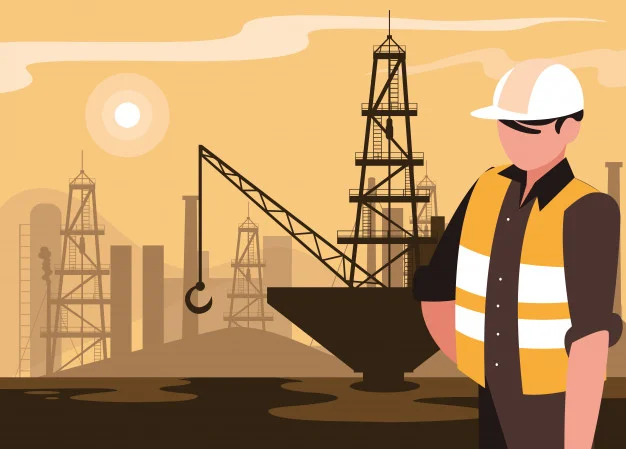
Mining activities have been long done by humans since thousands of years ago. Thanks to this, civilisation has evolved and got things easier from the iron age and bronze age.
Mining is also one of the important key players in fulfilling energy for humans’ needs. From the industrial revolution, the high demand of coal fueled mining to be one of the sectors to gear up the world's economy.
If you wish to continue your studies in mining or oil and gas majors, many universities and colleges abroad can be selected.
Some of the top destinations to study this course would be the US, Australia, and Canada.
What is Oil & Gas all about?
The Oil and Gas Engineering is a field combining engineering and the earth sciences. Oil and gas engineering is a subfield of petroleum engineering.
Petroleum engineering focuses on using knowledge about the earth's physical attributes to find hydrocarbon sources. Oil and gas engineers work for the energy industry to find the most likely spots for oil and gas deposits.
The education required for these fields is the same. In fact, most Oil and Gas engineers have degrees in Petroleum Engineering, though some also study Geology, Physics and other sciences.
Not just coal, mining sector also produces other metal that are vital for daily activities. Some of them are gold, copper, lead, nickel, diamond, and many others.
Other than mining, oil and gas is also an important commodity that can be the source of global energy that is vital for us. However, this field may lack of skilled manpower from time to time. As such, the demand for graduates in this field will always be high.
Graduates from Mining and Oil & Gas from abroad would have the right skills to venture in the career of mining and exploration of gas and minerals. Through this career, you will reap a lot of advantages personally and professionally.
What kind of subjects are taught in Oil & Gas studies?
Many degree courses in Oil & Gas follow professional body guidelines.
The subjects that you come across will vary, depending on the specialisation that you take in the major.
A glimpse of subjects that are offered for Mechanical Engineering (with Oil & Gas) course at Aberdeen University:
|
Year 1 |
|
|
Year 2 |
|
|
Year 3 |
|
|
Year 4 |
|
What are the skills and characteristics needed for Oil & Gas course?

Check the following qualities before you decide on taking this course to ensure that you’re prepared:
1. Teamwork
Team-work is common by nature in technical and engineering environments. It is crucial that you are able to work effectively with other people in the project team. These will help solve challenging problems fasts with the team’s collective effort to work out solutions and ideas.
2. Good attention to detail
Professionals in Oil & Gas are required to approach their tasks and project with a strong level of accuracy. By preventing errors, it will help to minimise any potential injuries. You will need to be able to foresee challenges in tasks and tackle them proactively.
3. Time management
Another skill students and graduates should have in the Oil and Gas industry are the ability to multitask and complete tasks in a timely manner. Usually, professionals in the industry will be working on multiple projects at a time, so being able to meet deadlines is crucial.
4. Communication skill
Effective communication is critical to ensure that all project team members are clear of the project needs and requirements. You will need to be able to express and communicate your ideas clearly across different departments even those who are not familiar with subject jargons.
Thankfully, you’ll get the training you need when pursuing an Oil & Gas degree.
Top Universities for Oil & Gas Courses
The table below showcases the world’s top universities for their mineral and mining (engineering) course, according to 2021 QS Ranking:
|
University |
Country |
|
USA |
|
| Curtin University | Australia |
| The University of Queensland | Australia |
| McGill University | Canada |
| The University of New South Wales (UNSW Sydney) | Australia |
| The University of Western Australia | Australia |
| Queen's University at Kingston | Canada |
| The University of Exeter | UK |
| University of British Columbia | Canada |
| Pennsylvania State University | USA |
What is the career and salary outlook for Oil & Gas graduates like?

You can find various careers in Oil & Gas.
Salaries and outlook for future job growth are dependent on the degree of Oil & Gas you have, as well as the area, or type of Oil & Gas you pursue
So, what can you do with your Oil & Gas degree? Check out the list below:
- Petroleum Engineer
- Energy Engineer
- Geoscientist
- Engineering Geologist
- Hydrographic Senior
- Mining Engineer
- Mudlogger
The below table showcases the different types of jobs within Oil & Gas and the expected salary according to PayScale:
|
Occupation |
Estimated Salary (per year) |
|
Petroleum Engineer |
$US 95,000 - 100,000 per year |
|
Energy Engineer |
$US 80,000 - 90,000 per year |
|
Geoscientist |
$US 62,000 - 150,000 per year |
|
Engineering Geologist |
$US 50,000 - 119,000 per year |
|
Hydrographic Surveyor |
$US 49,000 - 57,000 per year |
|
Mining Engineer |
$US 55,000 - 120,000 per year |
|
Mudlogger |
$US 21,000 - 68,000 per year |
How long is the duration of studies for Oil & Gas course?
The duration of studies will depend on the level of studies and the country that is taken.
|
Study Levels |
Duration |
|
Bachelor’s Degree |
4 years |
|
Master’s Degree |
1-3 years |
|
Doctoral Degree |
2-4 years |
What are the entry requirements for Oil & Gas course?
Each university and country has different entry requirements and the list below does not generalise the entry requirement of universities as a whole.
|
Bachelor’s Degree |
|
|
STPM |
Good standing |
|
A-Levels |
BBB in Mathematics, plus at least one from Physics, Design & Technology, Engineering or Chemistry |
|
International Baccalaureate |
Min. 26 points |
|
English |
IELTS (minimum 6.0 overall), TOEFL (minimum 550 or 80) |
|
Master’s Degree |
|
|
Bachelor’s Degree |
Min. B/ B+ average |
|
English |
IELTS (min. 7.0 overall) or TOEFL (min. 650 or 90) |
How much is the tuition fee to study Oil & Gas courses abroad?
There is a different variant to tuition fees, depending on the university that is chosen.
The estimated tuition fee per year for Oil & Gas course in the top universities can be seen here:
|
Programme |
Country |
Estimated Fees |
|
Undergraduate |
GBP 19,000 - 25,000 per year |
|
|
USD 25,000 - 30,000 per year |
||
|
Asia |
USD 10,000 - 20,000 per year |
|
|
Postgraduate |
United Kingdom |
GBP 15,000 - 25,000 per year |
|
United States |
USD 25,000 - 33,000 per year |
|
|
Asia |
USD 7,000 - 15,000 per year |
The fee above only covers the tuition fee and not other additional fees nor living expenses.
Living expenses of students abroad depend on the location of the university and the city that you live in.





 +60173309581
+60173309581




